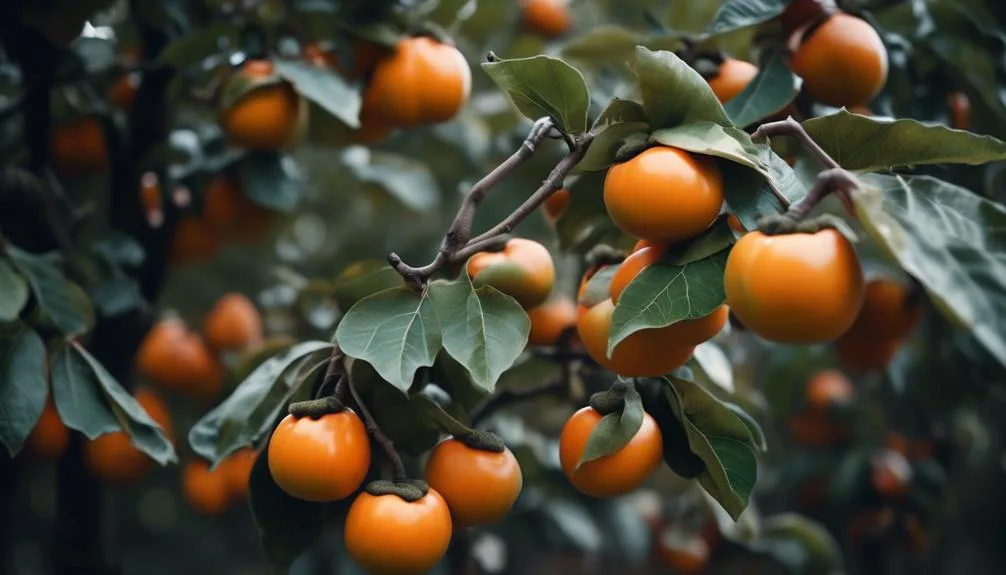Choosing the right persimmon tree for your garden can be tricky with so many options available. Factors like climate, fruit traits, and disease resistance play a role in making the best choice.
Let's explore the key considerations for selecting the perfect persimmon tree variety for your garden.
Key Takeaways
- Understanding the characteristics and growth habits of different persimmon tree varieties is crucial for a successful harvest.
- Consider the climate and location suitability, including factors such as temperature range, chilling hours, soil quality, drainage, and sun exposure.
- Evaluate fruit characteristics such as sweetness, texture, ripening time, fruit color, and astringency levels to choose a variety that aligns with personal preferences.
- Prioritize disease-resistant varieties to ensure tree health, high fruit quality, and reduced reliance on chemical treatments.
Understanding Persimmon Tree Varieties
When selecting a persimmon tree variety, it's essential to understand the different characteristics and growth habits of each type to ensure a successful and bountiful harvest.
First, consider the tree size. Some varieties, like the American persimmon, can grow up to 35 feet tall, while others, such as the Fuyu persimmon, are more compact, reaching around 15 feet. Understanding the tree size is crucial for planning the orchard layout and ensuring adequate space for growth.
Additionally, consider the pollination requirements. Some persimmon varieties are self-fertile, meaning they can produce fruit with their own pollen, while others require cross-pollination. It's important to know the specific pollination needs of your chosen variety to guarantee a fruitful harvest.
Considerations for Climate and Location
Considering the climate and location for your persimmon trees is crucial for ensuring a successful and thriving orchard. Climate compatibility and location suitability play a significant role in the health and productivity of your persimmon trees.
Here are some essential considerations to keep in mind:
- Climate Compatibility: Evaluate the average temperature range, chilling hours, and humidity levels in your area. Persimmon trees have varying cold hardiness and heat tolerance, so it's essential to choose a variety that aligns with your local climate.
- Location Suitability: Assess the soil quality, drainage, and sun exposure in your orchard site. Persimmon trees thrive in well-drained, loamy soil with good sun exposure. Understanding your location's specific conditions will help you select the most suitable persimmon tree variety for optimal growth and fruit production.
Evaluating Fruit Characteristics
To determine the most suitable persimmon tree variety for your orchard, it is essential to carefully evaluate the fruit characteristics to ensure optimal growth and a bountiful harvest. When evaluating persimmon fruit, consider sweetness, texture, ripening time, tree size, fruit color, and astringency levels. Here's a helpful table to compare different persimmon varieties:
| Fruit Characteristic | Description |
|---|---|
| Sweetness | Ranges from very sweet to mildly sweet |
| Texture | Can be crisp or soft when ripe |
| Ripening Time | Early, mid, or late season |
| Tree Size | Dwarf, semi-dwarf, or standard |
| Fruit Color | Typically ranges from yellow-orange to deep orange-red |
| Astringency Levels | Astringent when unripe, non-astringent when ripe |
Selecting Disease-Resistant Varieties
As you aim to identify the most suitable persimmon tree variety for your orchard, it's crucial to now explore the realm of disease-resistant varieties to ensure the continued health and productivity of your trees.
Selecting disease-resistant varieties is essential for effective pest management, maintaining tree health, and ensuring high fruit quality. When choosing a persimmon tree variety, prioritize those with strong disease resistance to safeguard your orchard's long-term viability.
Sourcing Quality Trees
When seeking out quality persimmon trees, scout for nurseries or suppliers with a proven track record of providing healthy, well-established saplings. It's essential to ensure the trees are free from diseases and pests, as this can greatly impact the tree's growth and fruit production. Here are some nursery options and factors to consider when evaluating tree health:
| Nursery Name | Tree Health Assessment |
|---|---|
| Garden Delights | Thorough inspection of leaves, branches, and roots for any signs of disease or pest infestation. |
| Orchard Oasis | Guarantee of disease-free trees and a history of robust, thriving persimmon saplings. |
| Tree Haven | Certified pest and disease-free trees, with a reputation for producing strong, healthy persimmon trees. |
| Nature's Nursery | Regular monitoring and testing for tree health, ensuring only the highest quality trees are sold. |
Choosing a reputable nursery with a focus on tree health is crucial for ensuring the successful establishment of your persimmon orchard.
Conclusion
In choosing the right persimmon tree variety, consider the climate, fruit characteristics, and disease resistance. Quality trees from reputable nurseries are essential.
By making thoughtful choices, you can plant the perfect persimmon tree for your needs and enjoy a bountiful harvest for years to come.
Happy planting, and may your garden flourish with delicious persimmons!

